新时代大学英语第三册Unit 8new
- 格式:ppt
- 大小:2.24 MB
- 文档页数:44
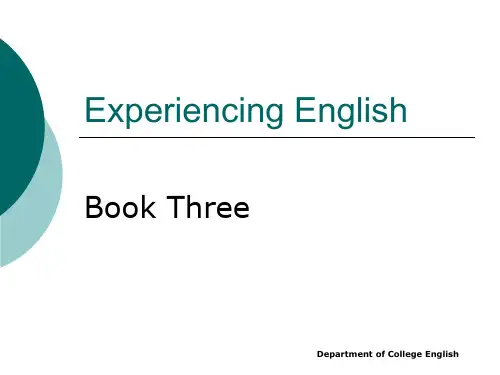
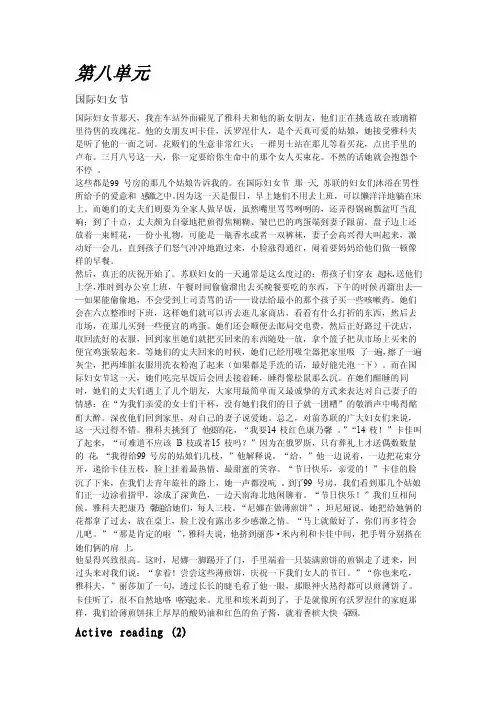
第八单元国际妇女节国际妇女节那天,我在车站外面碰见了雅科夫和他的新女朋友,他们正在挑选放在玻璃箱里待售的玫瑰花。
他的女朋友叫卡佳,沃罗涅什人,是个天真可爱的姑娘,她接受雅科夫是听了他的一面之词。
花贩们的生意非常红火;一群男士站在那儿等着买花,点出手里的卢布。
三月八号这一天,你一定要给你生命中的那个女人买束花。
不然的话她就会抱怨个不停。
这些都是99号房的那几个姑娘告诉我的。
在国际妇女节那一天, 苏联的妇女们沐浴在男性所给予的爱意和感激之中。
因为这一天是假日,早上她们不用去上班,可以懒洋洋地躺在床上。
而她们的丈夫们则要为全家人做早饭,虽然嘴里骂骂咧咧的,还弄得锅碗瓢盆叮当乱响;到了十点,丈夫颇为自豪地把煎得焦糊糊、皱巴巴的鸡蛋端到妻子跟前。
盘子边上还放着一束鲜花,一份小礼物,可能是一瓶香水或者一双裤袜,妻子会高兴得大叫起来,激动好一会儿,直到孩子们怒气冲冲地跑过来,小脸涨得通红,闹着要妈妈给他们做一顿像样的早餐。
然后,真正的庆祝开始了。
苏联妇女的一天通常是这么度过的:帮孩子们穿衣起床,送他们上学,准时到办公室上班,午餐时间偷偷溜出去买晚餐要吃的东西,下午的时候再溜出去——如果能偷偷地,不会受到上司责骂的话——设法给最小的那个孩子买一些咳嗽药。
她们会在六点整准时下班,这样她们就可以再去逛几家商店,看看有什么打折的东西,然后去市场,在那儿买到一些便宜的鸡蛋。
她们还会顺便去邮局交电费,然后正好路过干洗店,取回洗好的衣服,回到家里她们就把买回来的东西随处一放,拿个篮子把从市场上买来的便宜鸡蛋装起来。
等她们的丈夫回来的时候,她们已经用吸尘器把家里吸了一遍,擦了一遍灰尘,把两堆脏衣服用洗衣粉泡了起来(如果都是手洗的话,最好能先泡一下)。
而在国际妇女节这一天,她们吃完早饭后会回去接着睡,睡得像松鼠那么沉。
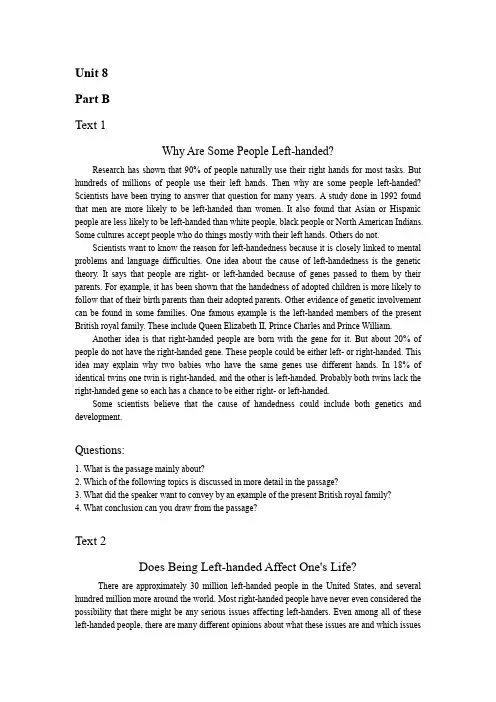
Unit 8Part BText 1Why Are Some People Left-handed?Research has shown that 90% of people naturally use their right hands for most tasks. But hundreds of millions of people use their left hands. Then why are some people left-handed? Scientists have been trying to answer that question for many years. A study done in 1992 found that men are more likely to be left-handed than women. It also found that Asian or Hispanic people are less likely to be left-handed than white people, black people or North American Indians. Some cultures accept people who do things mostly with their left hands. Others do not.Scientists want to know the reason for left-handedness because it is closely linked to mental problems and language difficulties. One idea about the cause of left-handedness is the genetic theory. It says that people are right- or left-handed because of genes passed to them by their parents. For example, it has been shown that the handedness of adopted children is more likely to follow that of their birth parents than their adopted parents. Other evidence of genetic involvement can be found in some families. One famous example is the left-handed members of the present British royal family. These include Queen Elizabeth II, Prince Charles and Prince William.Another idea is that right-handed people are born with the gene for it. But about 20% of people do not have the right-handed gene. These people could be either left- or right-handed. This idea may explain why two babies who have the same genes use different hands. In 18% of identical twins one twin is right-handed, and the other is left-handed. Probably both twins lack the right-handed gene so each has a chance to be either right- or left-handed.Some scientists believe that the cause of handedness could include both genetics and development.Questions:1. What is the passage mainly about?2. Which of the following topics is discussed in more detail in the passage?3. What did the speaker want to convey by an example of the present British royal family?4. What conclusion can you draw from the passage?Text 2Does Being Left-handed Affect One's Life?There are approximately 30 million left-handed people in the United States, and several hundred million more around the world. Most right-handed people have never even considered the possibility that there might be any serious issues affecting left-handers. Even among all of these left-handed people, there are many different opinions about what these issues are and which issuesmight be most important to them.Some left-handers think that being left-handed is a positive factor in their lives, and they feel that there are no serious issues affecting them. Others think that being left-handed is not a significant factor and has not affected their lives one way or another. There are also some left-handers who have no opinion and have never given any thought to what being left-handed has meant to them. But the majority of left-handed people find that being left-handed is at least a small disadvantage and a minor source of frustration in their lives.There are many things that right-handed people take for granted that are quite difficult for left-handers. These include many basic skills like learning to write, learning to use scissors and other hand tools and utensils, and learning various crafts and other activities. Sometimes left-handers are puzzled by equipment designed for right-handers, and other times they are confused by instructors and instructions geared toward teaching right-handers. For some left-handed people this amounts to occasional difficulties and minor inconveniences. For other left-handers it is a lifetime full of failures and frustrations that may lead to much more serious problems.Questions:1. What is the speaker's attitude toward left-handers?2. What can be inferred from the passage about right-handers?3. How do the majority of left-handers feel about their left-handedness?Part CLeft-handedness and Right-handedness in BabiesApproximately 90% of people in the world are naturally right-handed. Why is this so, and are we born one way or the other? The answer to this question is rather complicated.In babies and young children, no single side becomes dominant until around the age of eight. At 12 weeks, babies usually use both hands equally, but by 16 weeks, they mostly use the left hand for touching. By 24 weeks, they have changed again and start using both hands. Then at 28 weeks, they become one-handed again, although this time it is the right hand that is used more. At 32 weeks, they start using both hands again. When they reach the age of 36 weeks, there is another change, with most babies now preferring to use the left hand. Between 40 and 44 weeks, the right hand is once again more used. At 48 weeks, babies switch to using their left hands again, and then between 52 and 56 weeks, the right hand takes over.There are further changes still. At 80 weeks, the right hand loses control, and both are used again equally. When the young child reaches the age of two, the right hand takes over again, but between two and a half and three years, both hands are used equally. Things finally become stable at around four years and stay the same until, by the age of eight, one hand is strongly dominant over the other.Statements:1. At 12 weeks, both hands become dominant.2. By 24 weeks, right hand becomes dominant.3. By 36 weeks, left hand becomes dominant.4. Between 40 and 44 weeks, both hands become dominant.5. At 48 weeks, left hand becomes dominant.6. Between 52 and 56 weeks, both hands becomes dominant.7. At 80 weeks, both hands become dominant.8. At the age of two, right hand becomes dominant.9. Between two and a half and three years, both hands become dominant.10. By the age of eight, one hand is strongly dominant over the other.Part DBrain Organization and HandednessScientific studies during the 1970s and early 1980s suggested that differences in left- and right-handers' patterns of brain organization may be associated with differences in skills, abilities, and perhaps even personalities. In the large majority of right-handers, about 98 or 99 percent, speech is controlled by the left side of the brain.The right side of the brain, however, is usually used for recognizing and remembering faces and understanding relationships in space. In left-handers, it is difficult to know exactly their patterns of brain organization. About 65 to 70 percent of left-handers have speech controlled by the left side of the brain, which is also true of right-handers. But in 30 to 35 percent of left-handers speech is controlled by the right side of the brain. In some left-handers, both sides of the brain are capable of controlling speech.重点单词及词组Part BHispanic 西班牙的genetic 遗传的adopted 被收养的evidence 明显,痕迹approximately 大概地possibility 可能性positive 肯定的,实际的significant 重要的,有意义的frustration 挫败,挫折utensil 器具scissors 剪刀take for granted 想…当然Part Ccomplicated 复杂的dominant 占优势的lose control 失去控制Part Dassociate with 联合majority 多数,大半personality 个性,性格。
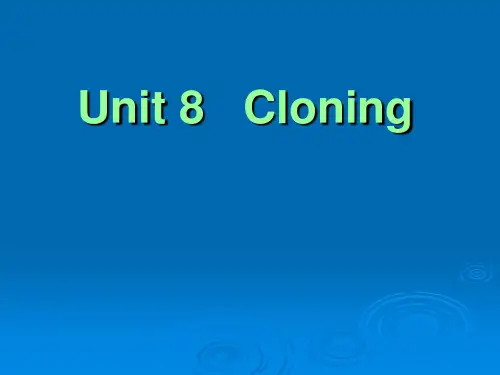

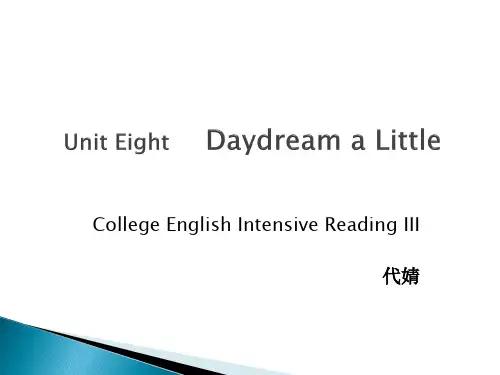



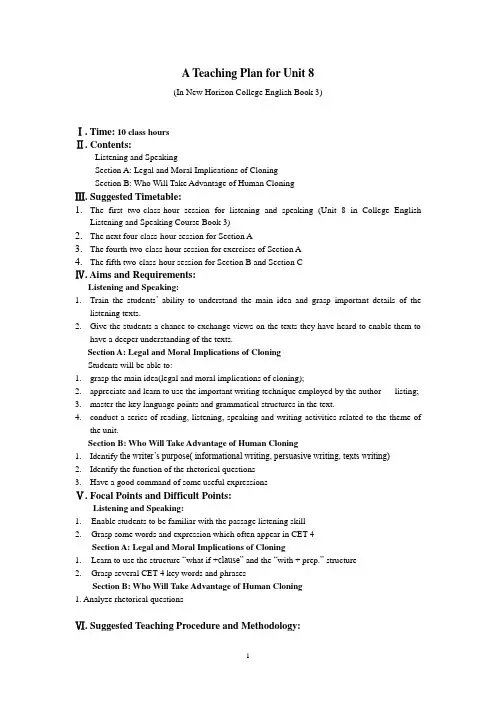
A Teaching Plan for Unit 8(In New Horizon College English Book 3)Ⅰ. Time: 10 class hoursⅡ. Contents:Listening and SpeakingSection A: Legal and Moral Implications of CloningSection B: Who Will Take Advantage of Human CloningⅢ. Suggested Timetable:1.The first two-class-hour session for listening and speaking (Unit 8 in College EnglishListening and Speaking Course Book 3)2.The next four-class-hour session for Section A3.The fourth two-class-hour session for exercises of Section A4.The fifth two-class-hour session for Section B and Section CⅣ. Aims and Requirements:Listening and Speaking:1.Train the students’ability to understand the main idea and grasp important details of thelistening texts.2.Give the students a chance to exchange views on the texts they have heard to enable them tohave a deeper understanding of the texts.Section A: Legal and Moral Implications of CloningStudents will be able to:1.grasp the main idea(legal and moral implications of cloning);2.appreciate and learn to use the important writing technique employed by the author---- listing;3.master the key language points and grammatical structures in the text.4.conduct a series of reading, listening, speaking and writing activities related to the theme ofthe unit.Section B: Who Will Take Advantage of Human Cloning1.Identify the writer’s purpose( informational writing, persuasive writing, texts writing)2.Identify the function of the rhetorical questions3.Have a good command of some useful expressionsⅤ. Focal Points and Difficult Points:Listening and Speaking:1.Enable students to be familiar with the passage listening skill2.Grasp some words and expression which often appear in CET-4Section A: Legal and Moral Implications of Cloning1.Learn to use the structure “what if +clause” and the “with + prep.” structure2.Grasp several CET-4 key words and phrasesSection B: Who Will Take Advantage of Human Cloning1. Analyze rhetorical questionsⅥ. Suggested Teaching Procedure and Methodology:Listening and Speaking: (an interactive approach is introduced)1. Pre-listening Task: arrange the students in pairs and ask them to discuss the followingquestions:(1). Do you have any friends who are left-handed? Do you find them special in any way?(2). What might happen if a left-handed child is forced to become right-handed?(3). Do you think left-handed people are more intelligent than right-handed people? Why or whynot?(4). What advantages and disadvantages do left-handed people have?Some key words and expressions in Language Focus:baffle: v. 1.be too difficult for sb to understand; puzzlee.g. One of the exam questions baffled me completely.2. prevent sb from doing something; frustratee.g. She baffled all our attempt to find her.2. Background Information:Handedness means a preference for the use of either the right hand or the left hand.According to statistics, approximately 75% of the human population is strongly right-handed, and approximately 90% is predominantly right-handed. Among the remaining 10%, some people are strongly left-handed, and others are left-handed for some activities and right-handed for others.Since ours is largely a right-handed world, people in many cultures used to regard left-handedness as abnormal. And left-handed people often have a tough time trying to adapt to the ways things were. At present, however, people are more understanding and almost all left-handed children are allowed to write with their left hands.Why some people are left-handed has been puzzling scientists for a long time. However, up to now no one has come up with a definitive answer, because no gene for left-handedness has been identified. But it does seem to run strongly within a family.3.Listening to text 1 and 24.Speaking tasks: ask the students to get into pairs and explain to them how to carry outSpeaking Task A—reflections on the texts, then select a pair to present their views in class.Section A: Legal and Moral Implications of Cloning1. Background Information1.cloning: the process of making a genetically identical organism through nonsexual means.2.DNA: (脱氧核糖核酸) the chemical at the center of the cells of living things whichcontrols the structure and the purpose of each cell and carries genetic information during reproduction.2.Pre-reading ActivitiesPlease listen to a short passage twice and answer some questions1.From a medical standpoint, what are the positive and negative effects of human cloning?2.From a social and moral standpoint, do you think cloning would be a good thing for humans?3.What is your opinion of genetic engineering, i.e. the deliberate altering of genes to createhuman beings according to certain requirements?听力原文:The creation of Dolly, a cloned sheep, has aroused great attention around the world. Wenow live in the reality of human cloning. This suggests, on one hand, great medical development and possibilities in curing previously incurable diseases. On the other hand, human cloning has brought confusion and fear to people who worry that it would threaten human society and dignity. If humans are produced, whom will we respect as ancestors, father, or mother? Will cloned people be true humans? The problem really is the creation of a new world order of humans.Answers:1. From a medical standpoint, what are the positive and negative effects of human cloning?It suggests, on one hand, great medical development and possibilities in curing previously incurable diseases.2. From a social and moral standpoint, do you think cloning would be a good thing for humans? Human cloning has brought confusion and fear to people who worry that it would threaten human society and dignity.3. What is your opinion of genetic engineering, i.e. the deliberate altering of genes to create human beings according to certain requirements?The problem really is the creation of a new world order of humans.3. Work on Section AA) Text Structure AnalysisThe essay focuses on one central theme: the legal and moral implications of cloning. It could be divided into four parts.Part 1 (Para.1): background situation of the passage--- with the success of cloning an adult mammal, a world with human clones was suddenly within reach.Part 2 (Paras.2-3): responses to the background situation mentioned in Para.1.Part 3 (Paras.4-18): a list if puzzles or questions.Part 4 (Para.19): Conclusion--- the list of questions could go on; people are just beginning to wonder about the future of the world after cloning.B) Raise some questions to make students grasp some detailed information in the text(question and answer method is used)P art 1 (Para.1)Question:(1) What caught the imagination of everyone?Answer: Word last week that a scientist named Ian Wilmut had succeeded in cloning an adult mammal.Part 2 (Paras.2-3)Questions: (1).To the first successfully cloned sheep, what are the responses from governments?(2). And how do scientists react to it?Answers: (1). Governments hurried to draft guidelines for the unknown future and President Clinton ordered a national commission to study the relative issues. Some countriesbegan examining the moral implications of cloning other species. (Para. 2)(2). Like the Theory of Relativity, the splitting of the atom, and the first space flight,cloning has generated a long list of difficult puzzles for scientists. (Para. 3)Part 3 (Paras.4-18)Questions: (1). How many puzzles or questions are mentioned in this part? And what are they?(2). What is the greatest concern about human cloning for society?Answers: (1). Six puzzles are mentioned. Why would anyone want to clone a human being in the first place? Will it be possible to clone the dead? Would a cloned human be identical tothe original? What if parents decided to clone a child in order to harvest organs? Howwould a human clone refer to the donor of its DNA? What are the other implications ofcloning for society?(2). The greatest concern is genetic engineering—the deliberate altering of genes tocreate human beings.Part 4(Para.19)Question: (1). Will questions about cloning end soon?Answer: No. The list of questions will go on.nguage PointsP art 1 (Para.1)1. At first it was just plain surprising.plain: ad. obviously; plainly; unmistakably (“Plain” is often used informally for “Plainly”)e.g. What Tom said was plain wrong.2.Word last week that a scientist named Ian Wilmut has succeeded in cloning an adultmammal—an achievement long thought impossible—caught the imagination of everyone. Meaning: The news that a scientist named Ian Wilmut had successfully cloned an adult mammal led people to imagine a lot. His successful clone was an achievement that has beenthought impossible for a long time.word: a piece of news or message (in this sense without a or the)e.g.. Word came that I was needed at home.有消息传来说家里需要我。

新时代交互英语第三册读写译答案Key to Exercises of Unit 8Reading 1I 1. 2)2. F F T T FF3. 1) common sense and knowledge2) a privacy policy; accuracy, access, security,3) maintain privacy, snoopers and con men, revealing your social security or credit card number and shipping address4) it can expose your system to a virus5) a personal code that you use to access your account with your ISPIII.Vocabulary and Structure1.加入到“赛博空间”旅行的行列常识和知识控制费用尤其,特别在公告板上留言停留销售活动的针对性个性化的广告未料到的支出款项确保你个人资料的保密性旅行保险请记住使你的计算机系统染上病毒预定一次旅行注册上不了网2.1)greet 2) scramble 3) foolproof 4) personalize 5) unsolicited6) require 7) hijack 8) disrupt 9) attachment 10) anonymous3. 1) device 2) deletes 3) highlight 4) download 5) confidentiality6) internal 7) retrieve 8) referenceIV.Banked Cloze1. 1) determine 2) charge 3) privacy 4) personal 5) collecting6) guarantees 7) passwords 8) access9) transmitted 10) assure2. 1) far-reaching 2) digital 3) anonymous 4) filters5) simulation 6) retreat 7) assume 8) isolatedV.Translation1.1) it will keep your charges under control2)Marketers, in particular, want to know as much about you and your buying habits.3) If you linger over a product or a subject that interest you,4) as it can expose your system to a virus.5) about accuracy, access, security, and protection of personal information2. 1)在“赛博空间”里,有如此多的事情可以做,有如此多的“站点”可以游览,因为你的因特网服务商在其网站上提供了大量的信息。
Unit 8 ChangePart II LISTENING AND SPEAKINGLesson A MillennialsListeningSCRIPTTrack 8-1The Millennial Generation includes people born roughly between the early nineteen eighties and the year two thousand. These people are in their teens and twenties today, and they are different from earlier generations in some important ways.Firstly, they’re more urban. In the early 1990s, only about 40 percent of all people lived in cities worldwide. Today, due to more work and educational opportunities in cities, more than 50 percent of the world's population live in an urban area, and many of those people are Millennials.Many Millennials are also better educated than people in earlier generations. Wealth worldwide is increasing. So families have more money to spend on educating their children. In the mid 1990s, for example, China had only three million college students; today there are more than 25 million and that number is increasing.Unlike earlier generations, many Millennials say they are more open to dating or marrying someone from a different background, in great part because it's easy to learn about other cultures via the Internet and social media. In the U.S., a recent study done by the Pew Research Center showed that over 85% of Millennials say they would date or marry someone from a different ethnic or cultural background; that number dropped to 55% for Americans aged 55 to 64 years old.Most Millennials aren't hurrying to get married, though. Worldwide, they are marrying later, or not at all. In the early nineteen nineties in South Korea, for example, women often married by age 25; today, many women are marrying at age 30. For men, that number jumped from age 28 to 32. What's causing this change? For some, they are waiting to marry until they have a good job—which is harder for some to get. Others are simply harder to please. They are waiting to find their ideal man or woman.1. be in their teens and twenties:十几岁、二十几岁2. due to:由于3. in the mid 1990s:二十世纪九十年代中期4. in great part:在很大程度上5. the Pew Research Center:皮尤研究中心,美国的一间独立性民调机构ConversationTrack 8–2A: In the past, fewer people used to live in cities. Today many more do.B: That’s a big change, and I definitely think it’s an improvement.A: Why’s that?B: There are more opportunities in a city.A: Yeah, but it’s also more crowded and expensive.Lesson B A Disappearing CultureListening 1SCRIPTTrack 8-3In Northern Pakistan, near the Afghan border, there is a group of people called the Kalasha. Once powerful and widespread, the Kalash civilization once had tens of thousands of people; today, there are only about 3,500. In just a few generations, this culture, which is over 3,000 years old, may disappear.Sayed Gul Kalash, a member of this community, is working hard to save her language and culture from extinction, but it won’t be easy. “Our language, spoken since 1,000 BCE, has no written script,” she explains. But the culture's early history, stories, and songs have a lot to teach us about ourselves and the human experience, says Gul Kalash. She is trying to preserve the language by writing down these stories and songs for the first time. In an increasingly globalized and connected world, languages like Mandarin and English, Russian and Hindi, Spanish and Arabic dominate. Parents in small villages often encourage their children to move away from their language and culture and toward those that will help them be more successful in life. Today, numbers are decreasing as more and more Kalash children are being educated in mainstream schools, and more people are moving away and marrying outside the Kalash culture. “It’s understandable,” says Sayed Gul Kalash. But she reminds us that every culture is unique and has value. When one culture is lost, we all lose something.1. extinction:灭绝2. Our language, spoken since 1,000 BCE, has no written script:塑造一种文字是非常困难的,很多民族都只有口头语言而没有书面文字。
新概念英语第三册第八课作文The Power of Habit.Habits are the invisible architects of our lives. They are the routines, the rituals, and the unconscious actions that guide us through the day, often without us even realizing their existence. They are the force that determines our choices, our behaviours, and ultimately, the direction of our lives. Understanding the power of habit and harnessing it for positive change can be transformational.The science of habit formation is fascinating. Itstarts with a trigger, which can be anything from aspecific emotion to a particular situation. This trigger cues our brain to enter into an automatic routine, which is the habit itself. The routine is followed by a reward, which gives us a sense of satisfaction or pleasure. This reward then becomes associated with the trigger, creating a loop that makes the habit difficult to break.For example, let's consider the habit of exercising.For many people, the trigger might be feeling sluggish or unhappy with their body. The routine involves going to the gym, running, or doing some other form of physical activity. The reward is the sense of accomplishment, the endorphin rush, and the improved physical health. Over time, thisloop becomes ingrained, and exercising becomes a habit that is difficult to ignore.However, not all habits are beneficial. Some habits can be destructive, leading to unhealthy behaviours andnegative outcomes. Smoking, overeating, and procrastinating are all examples of habits that can have a negative impact on our lives.Breaking these habits can be challenging, butit is not impossible.The key to breaking a bad habit and forming a good one lies in understanding the trigger-routine-reward loop. We need to identify the trigger that is causing the unwanted behaviour and then replace the routine with a more positive one. For example, if the trigger for overeating is boredomor stress, we can replace the routine of eating with the habit of taking a walk, reading a book, or engaging in some other form of self-care.The process of habit formation requires consistency and repetition. It takes time for a new habit to become ingrained, and it is during this period that we are most vulnerable to falling back into old patterns. It is important to be patient and to persevere, even when progress seems slow.The benefits of developing healthy habits are immense. Good habits can improve our physical health, enhance our mental well-being, and even improve our relationships. They can give us a sense of purpose and direction, making usfeel more fulfilled and satisfied with life.In conclusion, the power of habit cannot be underestimated. It shapes our actions, determines our choices, and ultimately, defines our lives. By understanding the science of habit formation and harnessing it for positive change, we can transform our lives for thebetter. We can break free from destructive habits and embrace new, healthier ones that lead us towards a more fulfilling and meaningful existence.。
新标准大学英语3unit8Unit 8 The Virtual World。
With the rapid development of technology, the virtual world has become an indispensable part of our daily lives. In this unit, we will focus on the impact of the virtual world on our lives, the advantages and disadvantages of virtual communication, and the influence of virtual reality on our perception of the world.Firstly, the virtual world has greatly changed the way we communicate and interact with others. Social media platforms and instant messaging apps have made it easier for us to connect with people from all over the world. We can share our thoughts, experiences, and emotions with others in real time, breaking the barriers of time and space. However, virtual communication also has its downsides. It can lead to misunderstandings, misinterpretations, and even conflicts due to the lack of non-verbal cues and emotional expressions.Moreover, the virtual world has revolutionized the way we experience the world around us. Virtual reality technology allows us to immerse ourselves in simulated environments and interact with virtual objects. It has been widely used in various fields such as education, entertainment, and healthcare. For example, students can take virtual field trips to explore different parts of the world, and patients can undergo virtual therapy to alleviate their pain and anxiety. However, excessive immersion in the virtual world may lead to a disconnection from reality and a decline in real-world social interactions.Furthermore, the virtual world has also brought about new challenges and ethical considerations. The rise of online gaming and virtual communities has raised concerns about addiction, cyberbullying, and privacy issues. It is important for us to strike a balance between our virtual and real lives, and to use technology responsibly and ethically.In conclusion, the virtual world has undoubtedly transformed the way we communicate, perceive the world, and live our lives. It has its pros and cons, and it iscrucial for us to be mindful of the impact of the virtual world on our well-being and society as a whole. As we continue to embrace the virtual world, let us not forget the importance of human connection, empathy, and genuine experiences in the real world.。